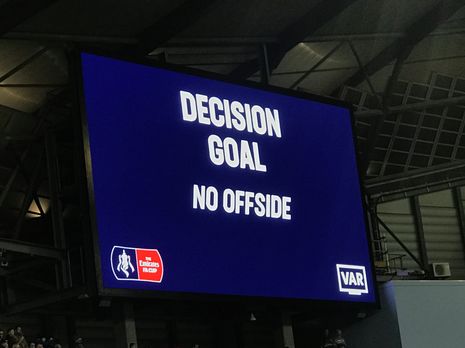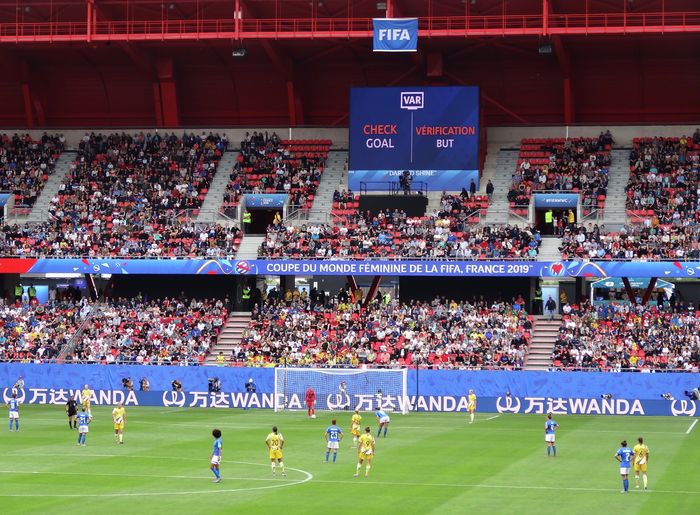Should Referees Be Mic’d Up?
In an effort to demystify the nature of officiating in the Premier League, Joseph Hill argues for the introduction of microphones to record and broadcast the conversations of referees.

After a 1-0 loss to West Bromwich Albion on the 27th of February, Brighton captain Lewis Dunk conducted one of the more fiery post-match press conferences I have seen in the Premier League. Trailing by a goal after eleven minutes, Dunk had taken a quick free-kick which caught West Brom napping and nestled in the bottom corner of the net. Referee Lee Mason initially ordered a retake, then gave the goal, then disallowed it again after a lengthy VAR check. The decision rested upon whether or not Mason had blown his whistle to allow the free kick, a fact he himself seemed to be oblivious towards.
Having watched the game live and reviewed the incident numerous times in an attempt to deconstruct the on-field fiasco, I am still none the wiser. After the game, Dunk labelled the decision as ‘embarrassing’ and ‘horrendous’, arguing that referees ‘hide behind their bubble’. This decision is just one of countless controversial decisions so far this season in the Premier League alone, raising questions surrounding the quality and accountability of refereeing in the domestic game.
“an increased sense of clarity could go some way towards... reducing the culture of hostility towards officials that runs from the top all the way through to the bottom of the game.”
The ‘bubble’ that Dunk describes is largely embodied by the PGMOL, the association responsible for upholding refereeing standards in English professional football. The organisation frequently assesses the capabilities of individual referees to operate at the standard required, as well as scoring match officials’ performances in each game they preside over. These scores are then compiled in order to assign performance-based bonuses at the end of the season. This form of salary-based accountability is largely internal, and does not shed light on the rationale of a referee’s decision-making or the process in which a Video Assistant Referee (VAR) check is completed.
In his interview, Dunk suggested that Mason should come out and conduct his own interview in order to articulate his thoughts surrounding the incident and receive questions surrounding his general performance in a match that saw two penalties as well as the Dunk free kick. While, in principle, I would support the idea of post-match interviews with match officials, decisions are often made in a split-second and allowing a lengthy interlude between a controversial call and an interview could obstruct, deliberately or otherwise, accurate recollection of the incident.
“...more transparency could ameliorate the flagging reputation of a relatively new introduction to modern football.”
Instead, football should transition to a system in which referees are mic’d up in games. Experimented with previously in the A-League in Australia, mic’d up referees would allow for complete communication between officials and those off the pitch such as coaching staff and fans. While watching England play Wales in the Six Nations, coincidentally on the same day as the Brighton debacle, I was struck by the way in which the referee communicated to the players and fans by virtue of a microphone. Similarly, if a decision is ‘reviewed’ in a cricket fixture, the use of technology on the screen is accompanied by the voices of the on-field umpire and those in control of the system. At the very least, football should echo rugby and cricket in allowing the conversation between on-field officials and VAR to be heard by fans. The number of contentious VAR decisions made this season suggests that the system is not fully understood by many, including myself a lot of the time, and more transparency could ameliorate the flagging reputation of a relatively new introduction to modern football.
Perhaps predictably, the idea of mic’d up officials is looked upon with suspicion by those in the upper echelons of the refereeing community. The issue of using microphones in games was discouraged by the International Football Association Board, who suggested that doing so may “harm the credibility and integrity of match officials”. This is obviously a risk in individual cases where a clear error is made, but I would argue that providing an increased sense of clarity regarding the judgement of officials could go some way towards demystifying the actions of referees and subsequently reduce the culture of hostility towards officials that runs from the top all the way through to the bottom of the game.
Anyone who has played Sunday League football has without doubt witnessed the often horrific treatment of referees from spectators as well as players, and a top-down approach could have impact outside of the professional game. While the game is perhaps not ready for referees being mic’d up for the full 90 minutes, the broadcasting of conversations between on-field referees and Stockley Park (where VAR is run) demonstrates an incremental and important step for contemporary football.
 News / Cambridge academics stand out in King’s 2026 Honours List2 January 2026
News / Cambridge academics stand out in King’s 2026 Honours List2 January 2026 Interviews / You don’t need to peak at Cambridge, says Robin Harding31 December 2025
Interviews / You don’t need to peak at Cambridge, says Robin Harding31 December 2025 Comment / What happened to men at Cambridge?31 December 2025
Comment / What happened to men at Cambridge?31 December 2025 Features / “It’s a momentary expression of rage”: reforming democracy from Cambridge4 January 2026
Features / “It’s a momentary expression of rage”: reforming democracy from Cambridge4 January 2026 News / Varsity’s biggest stories of 202531 December 2025
News / Varsity’s biggest stories of 202531 December 2025











